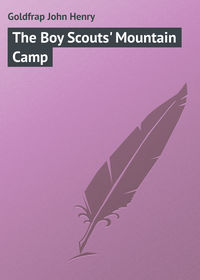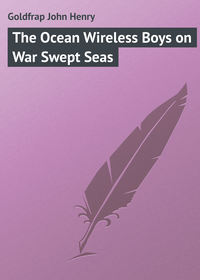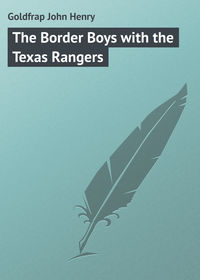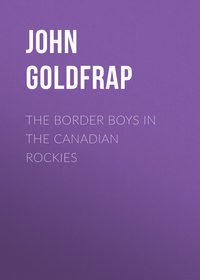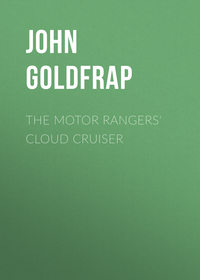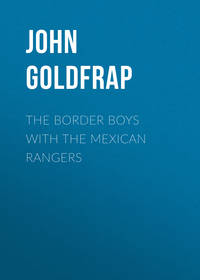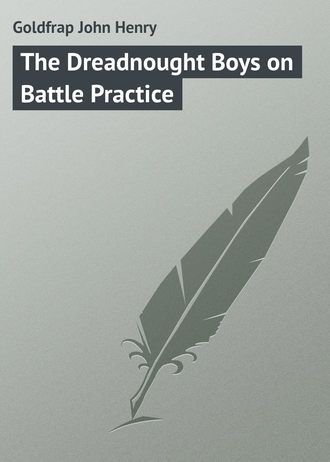 полная версия
полная версияThe Dreadnought Boys on Battle Practice
It was the boys' first opportunity to see the impressive ceremony of "colors," as the lowering of the flag on a man-o'-war is termed. The ceremony is not gone through at sea, and the boys had been below when it had been carried out in New York on their first night on board.
Now they were to witness one of the most impressive ceremonies of the United States Navy.
Division after division of the crew was formed in line and marched aft, in rhythmic tread, to the stern deck, on which stood Captain Dunham and a group of his officers in full uniform, the last rays of the sun glinting on their gold braid.
The men stood facing the flag and grouped on each side of the deck. Their hands raised uniformly in salute to the flag as at the last notes of the bugle it slowly descended the staff.
As it reached the deck, the band, stationed with their shining instruments on the starboard side of the ship, burst forth into the "Star-Spangled Banner."
The eyes of every man on that deck shone as the emblem for which they were pledged to fight fluttered down and the band blared forth the inspiring strains of the national anthem. Their officers stood in a little group, bare-headed, the chaplain conspicuous among them in his plain braided garb.
"First division, right about face!"
The sharp command of the ensign in charge of that division broke the impressive silence.
"March!"
Division after division, the men melted away from the after deck and left the little group of officers standing chatting alone. In all their after years in the navy, the two Dreadnought Boys never forgot that ceremony. Its recollection remained with them long after the annoying incidents and trials of their first year of service had faded.
There were three men in that crew, however, on whose hearts the solemn scene made no impression. These men were Carl Schultz, his friend Silas, and Ralph Kennell.
In the breast of the latter dark feelings of hatred burned, and a keen sense of humiliation over his deposition from the forward turret rendered him oblivious to any better feelings. As the second division, in which all three were stationed, wheeled to return forward, their eyes met, and in them there flashed something that seemed more than a mere gleam of recognition.
Was there actually more in the glance they exchanged than seemed to be the case? Was it a mutual sense that they were at the scene which was to be the theatre of their daring attempt?
We shall see.
As the Dreadnought Boys sat discussing the ceremony they had witnessed and earnestly talking over their plans and ambitions, they became aware that a hush had fallen over the fore deck and that a group of men were carrying something aft.
With the other men, they pressed closer to see what the burden was, and were startled to hear a sudden groan.
On the stretcher the men carried lay a bronze-faced jackie, his skin a deadly white under the brown. Drops of sweat – the moisture of agony – jetted his forehead as he was borne past on his way to the sick bay, where the surgeon and his assistants were already prepared to begin a battle for his life.
"It's Bill Hudgins," ran the word among the jackies. "He was crushed badly when the cable caught him as we dropped anchor."
Although the boys afterward had the pleasure of meeting Hudgins and congratulating him on his recovery, the incident taught them that even in times of peace there is peril to be faced on board a man-o'-war, and that it is the duty of Uncle Sam's fighters to meet it unflinchingly.
After supper that night, while the men were still discussing poor Hudgins' mishap, the boatswain's mate – the same one who had received them on board – hastened up to Ned and Herc as they lay on the fore deck, gazing at the soft tropic stars, and announced:
"It's an ill wind that blows nobody any good. Hudgins was signalman of the target officer's wherry. You boys go out in his place to-morrow."
CHAPTER XX.
HERC – A LIVING TARGET
To the keen disappointment of the boys, however, they found out the next day that they were not, as they had anticipated, to go together in the target officer's "wherry," as the small boat he used was called.
Ned was to accompany the officer – a young ensign named Rousseau – while Herc was to take his place as acting signalman in one of the two big whale boats that were detailed to attend to the targets. The man who ordinarily undertook this duty being assigned to the signal post in the "flying bridge" of the flagship.
Immediately after breakfast, the Manhattan, which was to have sole charge of the target-placing, lowered the three boats and one of her "steamers." The targets were set up on the floats already provided for them before the call for the first meal of the day sounded.
These targets were huge sheets of canvas twenty feet high and twenty-five feet broad, which were to be towed to a distance of a mile and a half from the battle-practice ground and anchored. Each was marked into squares by thin lines, with a big square of black in the center for a bull's-eye.
There were ten of them, and they were to be ranged in a line. The first test to be applied was firing by the flagship from anchorage. This was more to get the range than anything else. The real practice would come later, when the ships in column steamed past the targets, firing one after the other at designated marks. This was to be the real test of the fleet's gunnery, and one in which the men of the Idaho felt confident they would again shine preëminent.
The Manhattan's gun crews, on the contrary, felt just as sure of capturing the scarlet "meat ball," the trophy of the fleet.
The Manhattan's steamer lay, with a full head of power, alongside the man-o'-war as Ned and Herc, with their signal flags, emerged from their quarters forward with the rest of the men assigned to placing the targets.
The targets, as has been said, had already been set in place on the big collapsible scows which had been towed out from the shore during the night. Nothing remained but to tow them out and place them.
The range would then be picked up as soon as Ned wig-wagged the ensign's signal to the flagship that all was ready. For this purpose, the commanders of the different vessels had been summoned by signal to appear on the Connecticut that morning and take part in a "counsel of war" in the rear-admiral's cabin.
As Ned clambered down the sea ladder after the ensign and took his place in the little boat he was to occupy, he saw, with a start of surprise, that among Herc's companions in the whaleboat were Carl Schultz, the black-browed Silas, and Kennell. He felt further misgivings as he took notice of the black glances Kennell cast at the unconscious Herc, who was far too engrossed in the excitement of his first real duty to pay any attention to his shipmates.
Rapidly the boats were towed out to the spot selected for placing the first target, and Ned, with a telescope to his eye, anxiously watched the flagship for the signal to stop.
At last he spied the expected flags fluttering up on the halliards and notified the ensign.
"Make it so," rejoined that officer, and Ned rapidly "wig-wagged" that the signal had been seen and would be carried out. Herc, at the same moment, was standing in the stern of the whaleboat, doing the same thing.
The first target anchored, the "steamer" towed her convoy to the next position, which was indicated by a signal from the flagship as the first had been. One after another the targets were anchored in position, and at last, about an hour before eight bells – noon – everything was ready for the range testing, and the signal recalling the steamer fluttered from the flagship.
The whaleboat on which Herc was stationed was in command of a petty officer, as was the other small craft. The only commissioned officer assigned to the comparatively unimportant duty of target placing was, therefore, the ensign in the wherry in which Ned was posted as signalman. In this boat there was but one oarsman; however, he seemed to be plenty for the craft, which was a light one and rowed easily.
One after another a final inspection was made of the targets, and after a thorough overhauling, all was pronounced ready for the tests to begin.
To ascertain if all was in order, the ensign had his boat rowed up to each of the targets in turn. Ned, at his side, sent the signal that each was O. K. successively back to the flagship as they were examined.
"Rather awkward, sir, if they were to fire at a target while we were standing on the scow," remarked Ned, as they stood on the undulating platform supporting the last screen of canvas.
"Well, rather, Strong," laughed the ensign. "I imagine our earthly troubles would be over very shortly."
"But if the shell passed above us, sir?" asked Ned respectfully, as he wanted to accumulate all the knowledge he could of gunnery.
"The air currents generated by the high velocity of the shell would sweep anything within even ten feet of it to destruction," rejoined the ensign learnedly. "Of course," he added laughingly, "nobody has ever tested it, but I should imagine that the gases generated by such a projectile would poison anything that happened to be in the vicinity as it passed."
Ned nodded thoughtfully.
As they regained the wherry he gazed about him.
The sea stretched sparklingly blue under the tropic skies as far as the eye could reach.
Right ahead of them was extended the line of snowy targets, seeming huge enough at such close range, small as they appeared to the battleships a mile and a quarter off. In spite of the beauty of the scene and the glorious crispness of the sea air, Ned felt an oppression, the cause of which he himself would have found difficult to determine.
"If I was superstitious, I should say that I had a premon – a premon – Oh, I forget the word! But, anyhow, that I had a 'hunch' that something was going to happen," mused Ned to himself.
But it was no time for musing.
The whaleboats were beginning to back away to safe quarters before the firing commenced. At the ensign's command, the wherry followed them.
"Give them the signal to go ahead, Strong!" ordered the ensign sharply at length, as they lay bobbing at some distance from the targets. The bronzed arms of the oarsman were motionless and his eyes were fixed intently on the far-off line of battleships.
Ned stood erect in the stern of the plunging wherry. Awkward as the motion would have been to a landsman, to the Dreadnought Boy it was hardly noticeable.
His brown arms dipped and rose, and with their motion the red signal flag cut arcs against the blue sky.
Far off, on the bridge of the flagship, the lookout, gazing through his telescope, reported to the anxious group of officers that all was ready.
Rapidly the word was passed to the port twelve-inch turret, it having been decided to use the big guns on test work.
Boom!
The report followed a flash of red flame. The battleship trembled to her keel plates as the sound reverberated.
The shell sped screeching through the air.
"Phsiw-is-s-s-s-s-s-s-s!"
Straight for the end target it sped, and a second later the lookout, reading off Ned's wig-wagging signals, announced in a curt voice:
"Bull's-eye, sir."
A little chorus of congratulation followed among the officers.
"That's the stuff!" murmured the ensigns and middies.
"Excellent work," was the comment of their more dignified senior officers.
"Signal whaleboat Number One to replace canvas," ordered the ensign, and Ned promptly transmitted the signal to the boat in which Herc was signalman. The red-headed lad answered his chum's signal promptly, and in a minute the double-ender was scooting through the water on its errand.
The work of placing fresh canvas on the target did not consume long, and in a short time Herc, standing in the stern of the whaler, wig-wagged back to Ned that all was ready.
"Number One whaleboat signals 'all ready,' sir," announced Ned.
"Very well. Order them to pull away," said the ensign.
Ned transmitted the order, and the men who had been holding the boat to the scow by their boathooks cast off hastily.
Ned's attention was instantly turned to the ensign, awaiting fresh orders. Had it not been for that, he would have seen something transpiring on the whaleboat which would have filled him with rage.
Kennell it was who had charge of the stern boathook. His station was on the small grating astern of the petty officer's seat. On this grating Herc, too, was standing. As the boat was shoved off, Herc felt his feet suddenly twitched from under him, and the next minute he toppled headlong into the sea.
The crew of the boat, bending to their oars at top speed – for they knew that the deadly projectile would soon be winging toward them – apparently did not see what had occurred, and bent over their oars without a thought of Herc's peril. Kennell, with an evil grin on his hard features, clambered back into the boat with the look on his face of a man who has done a good day's work.
At the speed at which the whaleboat was urged through the water, it was out of earshot by the time Herc rose to the surface. Indeed, the unexpected immersion had resulted in his swallowing so much water that he was unable to shout.
Blowing a stream of water from his lips, he struck out for the nearest target, the one which had just been replaced.
"I'll just camp there till they see me," he thought.
A few strokes brought him alongside the float once more, and he scrambled up its wet sides, not without some difficulty. In fact, when he gained the flat upper surface of the target's support he was breathing heavily.
The sea, too, had risen since they had rowed out, and one of those sudden squalls that are so common in the tropics was whirling in from seaward. Herc did not see this, however – the mighty screen of canvas behind him veiled it from the boy's view.
The men in the boats had, however, spied the approaching bad weather, and orders were given to get up spray hoods in the bows of the craft.
"Well," thought Herc, "I'm being rocked in the cradle of the deep with a vengeance. However, I get a little rest from that eternal wig-wagging. That's one comfort."
Suddenly a thought struck him that sent a cold shiver down his spine.
In his new-found security he had given no thought to a peril that now loomed imminent.
He was seated on the float at which the flagship was firing.
At any moment they might send another shot toward it, and then what would happen?
"I'll signal them," thought Herc; but even as the thought entered his mind he recollected that as he had gone overboard the flags had gone with him.
He was marooned on a floating target, with every prospect of having a twelve-inch shell come shrieking toward him at any moment.
Suddenly Herc saw a string of flags hoisted on the flagship. Instinctively he knew what they meant.
Ned, his cousin and chum, had signaled that all was ready, and the Connecticut was about to open fire!
Situated far to the rear of the target as they were, Herc knew that those in the boats had not sighted him, and unless he was missed from the Number One whaleboat, his doom was sealed. He could have screamed aloud with real terror at the peril of his situation.
At almost the same instant his burning eyes saw a burst of flame suddenly flash from the side of the battleship. Herc's brain reeled. Already he could hear the scream of the shell, and in fancy saw his dismembered body flung in torn fragments before it.
"Phsiwis-is-s-s-s-s-s-s-s-s!"
The projectile shrieked nearer and nearer and passed like a thunderbolt through the target, ripping it from top to bottom with a vicious hiss. It plunged into the sea far beyond, ricocheting from wave to wave for two miles or more.
But the float was empty of life.
Herc had vanished.
CHAPTER XXI.
AFLOAT AND ASHORE
The petty officer in command of Number One whaleboat noted the effect of the shot and then looked about for Herc. As we know, the red-headed lad was not on board, nor did any inquiry among the crew bring a satisfactory explanation of his whereabouts.
The men had seen him standing on the stern, and then had lost track of him. They had supposed that he was "somewhere on board," they said.
Kennell alone volunteered an explanation.
"He may have tumbled overboard, sir," he suggested. "I saw him standing up in the stern-sheets as I cast off with my boathook."
"We must communicate with Ensign Rosseau at once," said the officer, greatly agitated.
He knew that a searching investigation would follow the loss of a man, and he foresaw that he would appear in no very creditable light without any explanation to offer as to the manner in which Herc had vanished.
Rapidly the whaleboat was rowed to the wherry, which "lay to" some distance away, with the Number Two whaleboat alongside.
The tidings of Herc's loss were received with some anxiety by the ensign. He turned to Ned, whose face had gone white at the news, and asked curtly if Herc could swim.
"Like a fish, sir," was Ned's rejoinder, although he had hard work to keep his lips from quivering at the thought of his friend's possible fate.
"Then there is a chance that he can be saved yet," breathed the ensign; "give way for that float yonder. Strong, signal the news to the flagship and inform them that we are standing by."
Ned, badly unnerved as he was, made the necessary signals, and received an order to "carry on" from the flag-ship.
The two whaleboats and the wherry at once got under way for the target near which Herc had last been seen.
Suddenly Ned gave a shout and pointed ahead.
"Look, sir, look!" he cried.
Not more than a hundred feet from them a rubicund object, which a second glance showed to be Herc's head, was bobbing about on the waves.
But the water had by this time grown dark and oily-looking. The approaching squall would burst in all its fury in a few minutes.
The work of saving the swimming lad must be accomplished within a brief few minutes, or not at all.
"Hold on, my lad, we'll get you," hailed the ensign encouragingly, as the wherry drew closer and closer to the plucky boy.
"Aye, aye, sir," hailed back Herc, expelling a thin stream of water from his lips and giving a cheerful grin; "but hurry up, for I've forgotten my lightning-rod, and it looks like thunder."
But, just as Herc's easy rescue seemed a matter of certainty, the intentions of his saviors were interfered with in a startling fashion.
It was Ned who saw the impending peril first.
"Look! Look there!" he shouted. "What's that, sir?"
"That" was a black, triangular object, moving through the water toward the unconscious Herc, who was treading water easily. The dark object came on at a rapid pace, the ripples parting on each side of it as it cut its way along.
The ensign's reply to Ned's exclamation was a cry of alarm.
"Give way!" he shouted. "We've got to get that man quickly, if at all."
Ned looked his question.
"It's a shark!" shot out the ensign, his face ashy-white and his lips sternly compressed; "these waters swarm with them."
Ned was almost unnerved. The boat was still some feet from Herc, and the triangular fin was now close upon the lad.
Suddenly its steady motion ceased, and it shot forward with a rush.
At the same instant Herc perceived his peril, and gave one harrowing shriek, as he saw the terrible nature of the approaching peril.
He swam desperately toward the boats, his countenance strained and lined with the effort and the horror under which he labored.
"Crack!"
The sharp bark of a service revolver sounded.
"Crack! crack!"
Again and again the reports reverberated, and the water behind Herc grew troubled and crimson.
The fin vanished and only a small whirlpool remained to show where the mortally wounded shark had sunk slowly downward.
In the stern of the wherry stood Ned, his face set and stern, and in his hand the navy revolver that had done the work.
It was the ensign's weapon, which he had laid on the stern seat for his greater ease in moving about.
Ned, casting about for some means of saving Herc, had suddenly spied it, and, on the impulse of the moment, had snatched it up and fired.
"Well done, my lad," said the ensign in a voice that still trembled from the keen tension of the past few minutes.
"Sir – I – " began Ned, somewhat alarmed, now that Herc was out of danger. He had committed what he knew must be a breach of discipline in seizing the officer's pistol.
"You mean that it wasn't quite the thing to do to use my revolver," laughed the ensign. "My lad, I'm proud that it was put to such good service; glad that you were quick enough of wit to use it in the nick of time."
A few moments later Herc was on board the wherry, and in reply to the eager questions of its occupants, gave them a brief account of his accident. He did not mention the fact that it was Kennell who had tripped him for the second time, however, saving that for Ned's private ear later on. Herc had his own ideas about getting even with the brutal blue-jacket.
"When I saw that nothing could save me from being 'wiped out,' I stayed on the float," related Herc. "I recollected that I had felt an iron brace on its subsurface with my foot, as I clambered up on to it.
"The minute I saw the signal, therefore, I dived and hung on to the brace under water till I felt sure the shell had passed. Then I came up to the surface, and the rest you know."
"Thanks to your friend Strong, here," amended the ensign, "whose gallant conduct and presence of mind I mean to mention especially to Captain Dunham on our return to the ship. Had it not been for Strong's quick and sure aim, your adventure might have had a different termination, my man."
And now the long-expected squall burst in leaden-colored fury. To the boys, who had never witnessed a tropical squall, its rage was amazing. The flag-ship, which had seen its approach, had already signaled the recall, and the boats were on their way back to the Manhattan when the tempest broke.
"Bale boat!" was the order transmitted through the little flotilla as the waves began to come climbing over the bows of the small craft and torrents of rain invaded them also.
By the time the battleship's side was reached, however, the squall was over and the sun shining out brightly once more.
"That's the suddenest thing I ever saw," gasped Ned to Herc, as they regained the deck of their five-million-dollar home, as Herc called the big Dreadnought.
"It's not half as sudden as what's going to happen to a young party named Kennell before very long," grinned Herc meaningly.
Two nights later there was a brilliant scene at the Hotel del Gran Plaza, the principal hostelry of Guantanamo. The mayor and civic dignitaries of the town, together with the merchants of the place, were giving a dinner and reception to the officers of the squadron.
During the time that had elapsed since Herc's rescue, the Dreadnought Boys had been participating in their capacity as two of the crew of the forward turret in battle practice. They had in that time become used to the big twelve-inch gun, and proved themselves capable of the responsibility and confidence vested in them by their officers.
Well pleased with themselves, therefore, the two lads had come off the ship that evening for shore leave. They had employed much of their time in strolling about, buying souvenirs and post-cards – which have even invaded Cuba – and seeing the few sights the town had to offer. Being both temperate, clean-cut young fellows, the low drinking dens and other resorts of the place had no attraction for them, although they were well patronized by a number of the sailors. To the credit of Uncle Sam's navy, though, be it said that the keepers of such places are coming to look less and less to the wearers of naval uniforms for their profits. The man-o'-warsman of to-day is an ambitious young fellow. He is far too anxious to get ahead in his chosen profession to haunt places of foolish dissipation.
"Say, Ned – moving pictures!" Herc nudged his companion, as the two stood in front of a brilliantly lighted building on the main street of the Cuban town.


